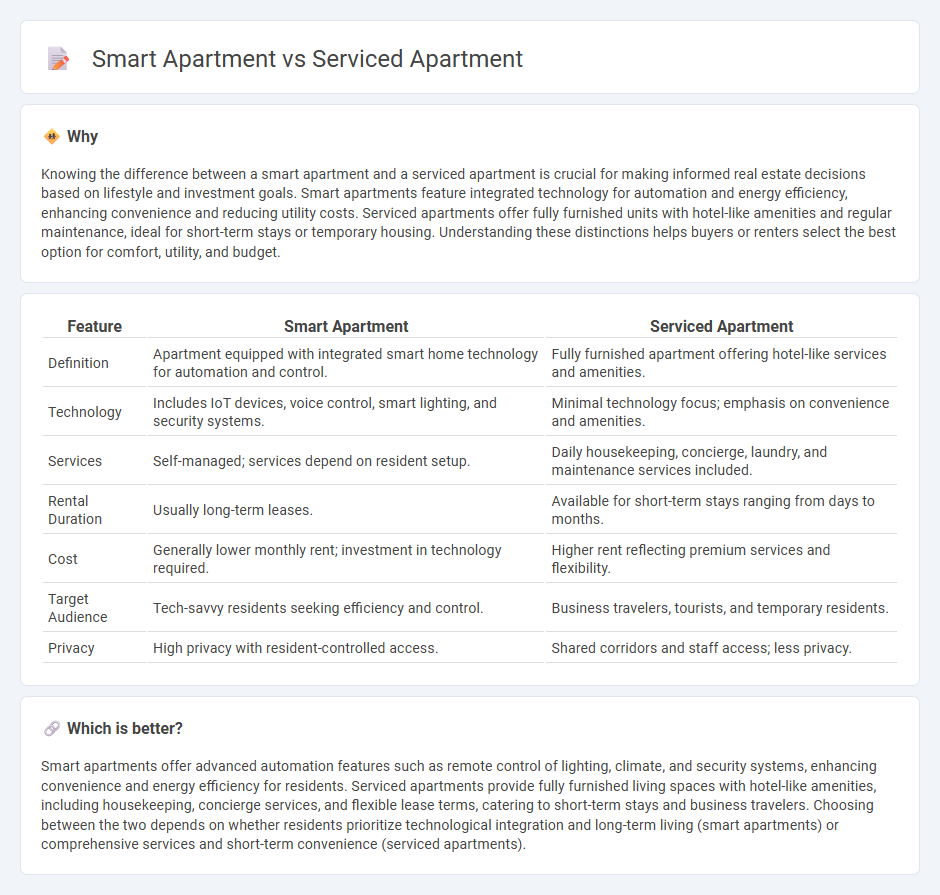
Smart apartments integrate advanced automation technologies like IoT sensors, voice control, and energy-efficient systems to enhance convenience and sustainability. Serviced apartments provide fully furnished living spaces with hotel-like amenities such as housekeeping, concierge, and flexible lease terms, catering to short-term and business travelers. Discover the key differences and benefits of smart apartments versus serviced apartments for your ideal living experience.
Why it is important
Knowing the difference between a smart apartment and a serviced apartment is crucial for making informed real estate decisions based on lifestyle and investment goals. Smart apartments feature integrated technology for automation and energy efficiency, enhancing convenience and reducing utility costs. Serviced apartments offer fully furnished units with hotel-like amenities and regular maintenance, ideal for short-term stays or temporary housing. Understanding these distinctions helps buyers or renters select the best option for comfort, utility, and budget.
Comparison Table
| Feature | Smart Apartment | Serviced Apartment |
|---|---|---|
| Definition | Apartment equipped with integrated smart home technology for automation and control. | Fully furnished apartment offering hotel-like services and amenities. |
| Technology | Includes IoT devices, voice control, smart lighting, and security systems. | Minimal technology focus; emphasis on convenience and amenities. |
| Services | Self-managed; services depend on resident setup. | Daily housekeeping, concierge, laundry, and maintenance services included. |
| Rental Duration | Usually long-term leases. | Available for short-term stays ranging from days to months. |
| Cost | Generally lower monthly rent; investment in technology required. | Higher rent reflecting premium services and flexibility. |
| Target Audience | Tech-savvy residents seeking efficiency and control. | Business travelers, tourists, and temporary residents. |
| Privacy | High privacy with resident-controlled access. | Shared corridors and staff access; less privacy. |
Which is better?
Smart apartments offer advanced automation features such as remote control of lighting, climate, and security systems, enhancing convenience and energy efficiency for residents. Serviced apartments provide fully furnished living spaces with hotel-like amenities, including housekeeping, concierge services, and flexible lease terms, catering to short-term stays and business travelers. Choosing between the two depends on whether residents prioritize technological integration and long-term living (smart apartments) or comprehensive services and short-term convenience (serviced apartments).
Connection
Smart apartments integrate advanced IoT technology to enhance convenience, energy efficiency, and security, which aligns closely with the serviced apartment model that offers fully furnished, short-term rental units with hotel-like amenities. Both smart and serviced apartments cater to the growing demand for flexible, tech-savvy living solutions in urban real estate markets, attracting busy professionals and travelers. Incorporating smart technologies in serviced apartments elevates the tenant experience by combining automated controls with personalized services, optimizing property management and guest satisfaction.
Key Terms
Amenities
Serviced apartments offer comprehensive amenities such as housekeeping, 24/7 concierge services, fully equipped kitchens, and fitness centers, providing a hotel-like experience with long-term stay convenience. Smart apartments integrate technology-driven features like automated lighting, climate control, security systems, and voice-activated assistants to enhance comfort and energy efficiency. Explore the differences in amenities to determine which living option suits your lifestyle best.
Automation
Serviced apartments provide enhanced comfort through professional management and housekeeping services, while smart apartments emphasize automation by integrating IoT devices for lighting, climate control, and security. Automation in smart apartments enables residents to control home systems remotely via smartphones or voice commands, optimizing energy efficiency and convenience compared to traditional serviced apartment offerings. Explore how automation transforms living spaces by comparing serviced and smart apartments in detail.
Management
Serviced apartments provide professional on-site management including housekeeping, maintenance, and guest services to ensure a seamless living experience. Smart apartments integrate automated systems such as IoT devices and remote control features, enabling efficient energy management and remote monitoring but often rely on external service providers for maintenance. Explore the differences in management approaches and benefits to determine which apartment type suits your lifestyle.
Source and External Links
What Is a Serviced Apartment? Types, Benefits and Prices - A serviced apartment is a self-contained, fully furnished temporary accommodation offering home-like comforts, kitchen facilities, and regular housekeeping, bookable for short or long stays.
What are Serviced Apartments? | Apartmentservice - Serviced apartments are fully furnished units with separate living and sleeping areas, a kitchen, and hotel-like services such as cleaning, providing independence and flexibility for guests.
What's the Difference Between Serviced Apartments and Hotel Stays? - Serviced apartments are geared toward longer stays, offer more space and amenities like full kitchens and laundry, and are typically more cost-effective than hotels for extended visits.
 dowidth.com
dowidth.com